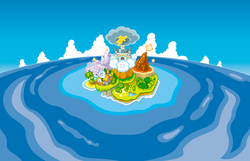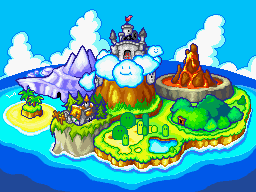Vibe Island: Difference between revisions
From the Super Mario Wiki, the Mario encyclopedia
Jump to navigationJump to search
(coding, move references down) |
m (Text replacement - "Fra([AE]?M? *)=" to "Fre$1=") |
||
| (26 intermediate revisions by 14 users not shown) | |||
| Line 1: | Line 1: | ||
{{location | {{location infobox | ||
|image=Vibe_Island. | |image=[[File:Vibe_Island.png|250px]] | ||
| | |||
|capital= | |capital= | ||
|ruler= | |ruler= | ||
| Line 8: | Line 7: | ||
|latest_appearance= | |latest_appearance= | ||
}} | }} | ||
{{ | {{SPP map}} | ||
'''Vibe Island''' is the main setting of ''[[Super Princess Peach]]''. When [[Mario]], [[Luigi]] and the [[Toad (species)|Toad]]s are kidnapped by the [[Hammer Bro]]s., they are taken to this mysterious island and Peach must save them. Peach's [[ | '''Vibe Island''' is the main setting of ''[[Super Princess Peach]]''. When [[Mario]], [[Luigi]] and the [[Toad (species)|Toad]]s are kidnapped by the [[Hammer Bro]]s., they are taken to this mysterious island and [[Princess Peach|Peach]] must save them. The [[Vibe Scepter]] was discovered on the beaches of Vibe Island. Peach's [[vibe]]s gains empathic powers after visiting the location. | ||
==Vibes== | ==Vibes== | ||
On Vibe Island, all kinds of enemies have one of four different [[ | On Vibe Island, all kinds of enemies have one of four different [[vibe]]s, due to the island. The vibes are: | ||
*[[Joy (vibe)|Joy]] | *[[Joy (vibe)|Joy]] | ||
*[[Rage]] | |||
*[[Gloom]] | *[[Gloom]] | ||
*[[Calm]] | *[[Calm]] | ||
Most bosses in the game also use these | Most bosses in the game also use these vibes to their advantage. | ||
==Locations== | ==Locations== | ||
| Line 29: | Line 28: | ||
*[[Bowser's Villa]] | *[[Bowser's Villa]] | ||
== Names in other languages == | ==Names in other languages== | ||
{{ | {{foreign names | ||
|Jap= | |Jap=キド・アイラック{{hover|島|とう}}<ref>''Super Princess Peach'' Japanese instruction booklet, page 4.</ref> | ||
|JapR=Kido | |JapR=Kido Airakku tō | ||
|JapM=Island | |JapM="Kido Airakku" is from「喜怒哀楽」(''ki-do-ai-raku'', emotions) with {{wp|sokuon}} added, and「島」means "island" | ||
| | |Spa=Isla Sensa | ||
| | |SpaM=Sensation Island | ||
|Ger= | |Fre=L'île des Emotions | ||
|FreM=The Island of Emotions | |||
|Ger=Die Gemütsinsel | |||
|GerM=The Temper Island | |||
|Ita=Emoziolandia | |||
|ItaM=Emotionland | |||
}} | }} | ||
==References== | ==References== | ||
<references/> | <references/> | ||
{{SPP}} | {{SPP}} | ||
[[Category:Islands]] | [[Category:Islands]] | ||
[[Category:Super Princess Peach]] | [[Category:Super Princess Peach]] | ||
[[it:Emoziolandia]] | |||
Latest revision as of 12:05, January 8, 2024
| Vibe Island | |
|---|---|

| |
| First appearance | Super Princess Peach (2005) |
| Inhabitants | Goombas, Koopa Troopas |
Vibe Island is the main setting of Super Princess Peach. When Mario, Luigi and the Toads are kidnapped by the Hammer Bros., they are taken to this mysterious island and Peach must save them. The Vibe Scepter was discovered on the beaches of Vibe Island. Peach's vibes gains empathic powers after visiting the location.
Vibes[edit]
On Vibe Island, all kinds of enemies have one of four different vibes, due to the island. The vibes are:
Most bosses in the game also use these vibes to their advantage.
Locations[edit]
- Ladida Plains
- Hoo's Wood
- Shriek Mansion
- Fury Volcano
- Wavy Beach
- Gleam Glacier
- Giddy Sky
- Bowser's Villa
Names in other languages[edit]
| Language | Name | Meaning |
|---|---|---|
| Japanese | キド・アイラック島[1] Kido Airakku tō |
"Kido Airakku" is from「喜怒哀楽」(ki-do-ai-raku, emotions) with sokuon added, and「島」means "island" |
| French | L'île des Emotions |
The Island of Emotions |
| German | Die Gemütsinsel |
The Temper Island |
| Italian | Emoziolandia |
Emotionland |
| Spanish | Isla Sensa |
Sensation Island |
References[edit]
- ^ Super Princess Peach Japanese instruction booklet, page 4.

